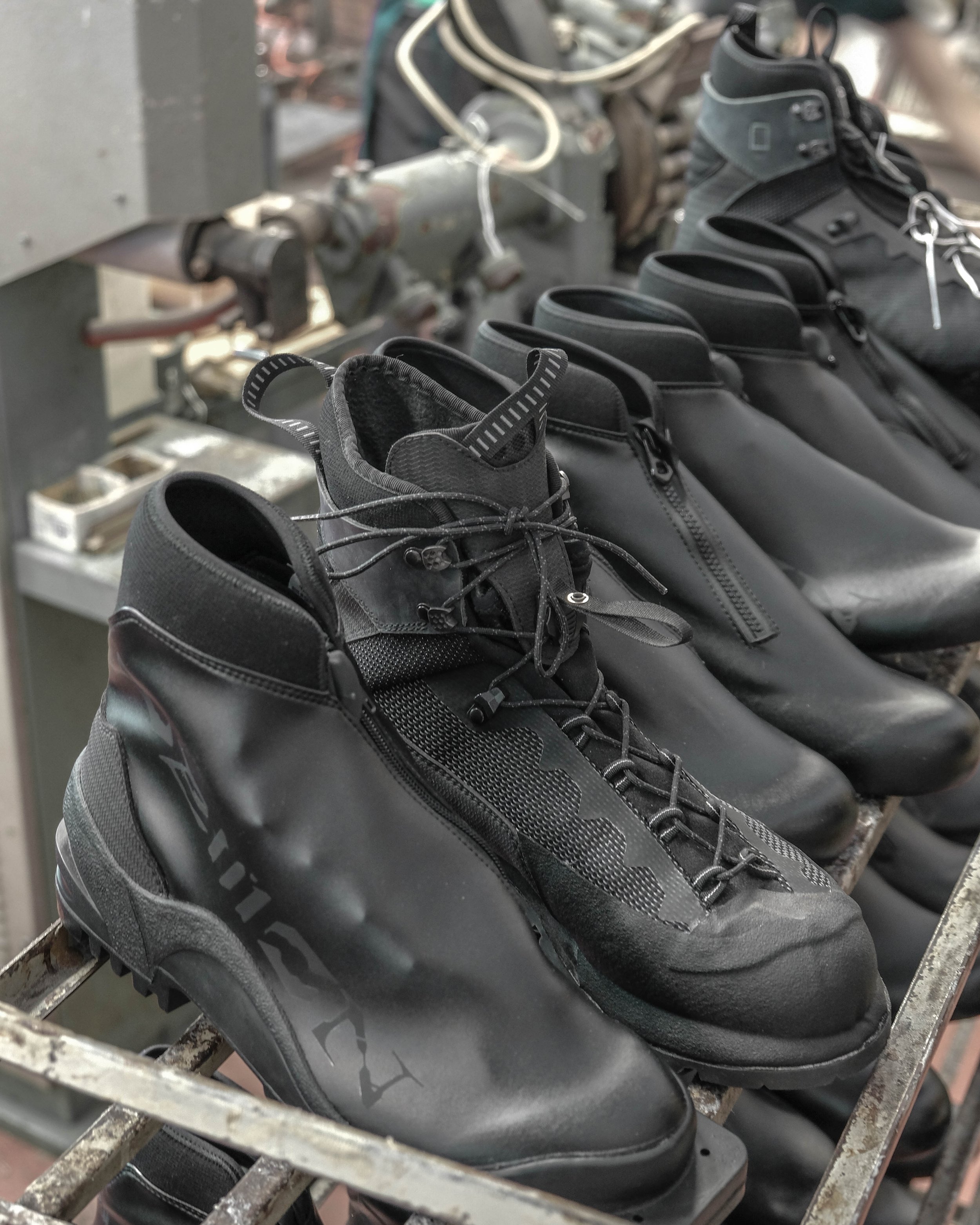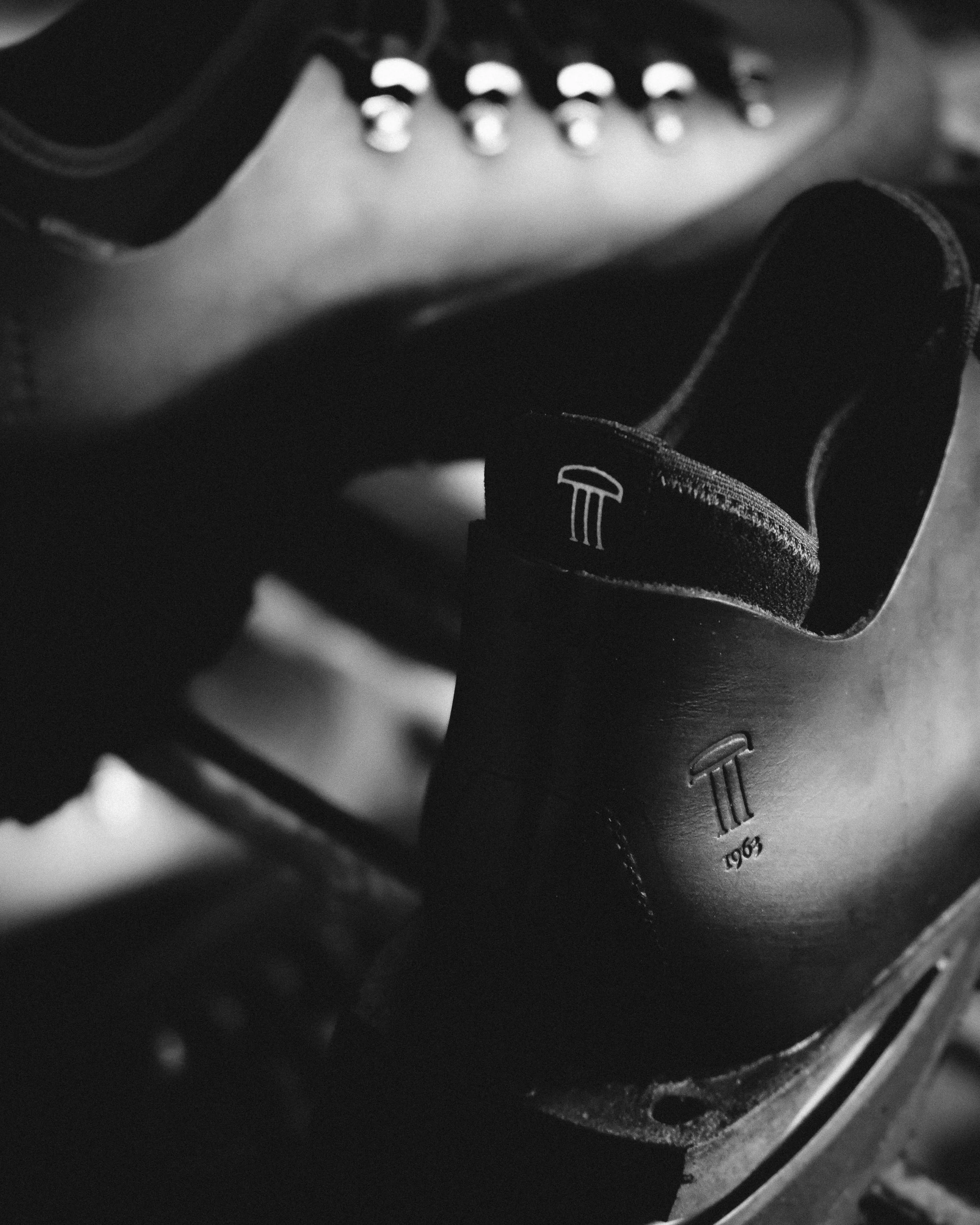Between The Lines 014: DEMON
Generational Sensitivity with Alberto Deon
Words: Siân Toolan
Alberto Deon, the Creative Director of DEMON, discusses the resurrection of his grandfather’s footwear brand, respecting its heritage and wildly reshaping its identity for a new generation.
It’s quite possible you’ve never heard of DEMON, unless you were hiking the Dolomites and a gorp enthusiast before 2004. Founded by shoemaker Girolamo Deon in 1963, in the Italian manufacturing hub of Montebelluna, DEMON established itself as a commercial performance hiking brand, with a vast market across the UK, Europe, and Japan. Until its cessation - when the family saw best to close-up shop - the brand was inseparable from its geographical context; renowned for its Italian craftsmanship and mastery of technical design. Despite its extended dormancy, DEMON has returned and is well worth your attention.
Resurrected in 2020 by Alberto Deon, the third generation of the family, the DEMON of today might just live up to its mischievous name. Launching with three key silhouettes - the Poyana, Graelòn, and Carbonàz - Deon’s vision admires DEMON’s long-held core values whilst offering a fresh, and avant-garde, reinterpretation of them. Taking cues from performance footwear and distorting them, Deon’s approach is very much defined by a “generational sensitivity”, fuelled by curiosity, humour, and his own experience.
“Architectural education encourages you to be both radical and design conscious, injecting your personality whilst understanding that what you’re designing needs to last.”
It’s funny then, that Deon began with zero experience in the footwear field (or fashion, or product design for that matter). An architecture student in London, Alberto Deon’s DEMON was nothing more than “a creative exercise”; a technical flat of the side of a shoe with a killer sole unit, soon to metamorphose into the Poyana. As commercial viability was far from his mind, Deon had the necessary room to breathe, “to create freely” and organically and that’s undeniably part of the brand’s magic. He explains the “pretty robust sensation” that he was onto something and that’s where Luca Benini came in.
It’s fair to say that Slam-Jam founder Luca Benini prophesied the mainstream emergence of the outdoor movement via ROA Hiking back in 2015 and what Benini saw in DEMON was “an evolution of that post-gorpcore sensitivity”. Whilst Deon still had much to figure out at the time, Slam Jam would provide a new commercial reality whilst reinforcing the tone of the brand. Now sold exclusively by the Milan-based retailer, the partnership has been an “incubator” for DEMON, allowing them to take steps into streetwear and align themselves with a new demographic whilst maintaining a unique design sensibility.
This design sensibility treads the line between fashion and technicality, heritage and innovation, simplicity and absurdity, it is “a personal cauldron of inspirations”, a balancing act best demonstrated by that very first design. The Poyana is at once hostile but grounding; a hefty hoof-like sole that extends beyond its upper, but the more you look, the less jarring it becomes. “They almost feel like you’ve seen them before, but you haven’t”, says Deon. Imagine Scarpa and Dr. Martens procreated, add a little extra spice and you’ll see Poyana’s silhouette. It’s a street-friendly shoe, a simple upper crafted from vegetable-tanned leather (or ripstop) sat atop a stacked sculptural mid-sole, but just as easily as it can fit in your wardrobe, it can carry you up mountains. The material construction borrows plenty of details from performance footwear, undergoing a waterproof double-lasting process with eFoam protection binding that wraps the entire front panel, a sock-lining stretch nylon gaiter, speed-lace metal hardware and a classic Vibram outsole. The subsequent zip-up Graelòn and Carbonàz boot were developed to establish the brand within this context of mountaineering, honouring his grandfather’s archive and, ultimately, valuing the brand’s geography.
DEMON reflects upon Deon’s specific upbringing but also the wider context of Veneto and the industrial towns of North East Italy. “The process of designing something is very much linked to the actual capacity of fabricating that thing. It's something that I didn't quite know,” he explains, when you produce something in Italy “you have to confront the wider historical base of shoemaking”. In selecting specific materials and who to work with, DEMON subscribes - in part - to the long-established design language of Italian production, something we, as consumers associate with quality and craft. Whilst producing in Italy has created certain limitations, it’s provided “a frame of reference” for the brand. Deon elaborates, that given “the unlimited syntax of possibilities of production in China would not likely provide the specific DEMON feeling”; that magic. It Italy, “you’re really collaborating with local artisans”, finding the middle ground between wild and free design and a factory’s way of doing things. With the determination to innovate and an understanding of modern footwear, DEMON has cross-pollinated local, organic materials with technical performance fabric, pushing Italian craft into new - and eventually more sustainable - territory. It’s a process, he explains, “making the product look even more local and distorting that feeling of familiarity with certain details”.
That’s exactly how Deon describes the outcome of Poyana, it’s an “unfamiliar familiarity”. It’s a distortion of the archetypical hiking boot, taking something we understand, we recognise and exaggerating it or pushing it. It’s playful and experimental but not about driving products to the upmost extreme, rather about turning up the volume and this is explicitly evidenced in Poyana’s sole unit. Where that comes from, Deon believes, is a “generational sensitivity”; a mutual aspect of the millennial and Generation X mindset that is concerned with questioning tradition and, as he puts it, “mocking things”. Deon cites Demna’s Balenciaga and Vetements for popularising this parodic approach, from DHL tees to the Triple S, he extrapolated and re-contextualised normcore and the everyday to encourage consumers to reflect upon their definitions of luxury. DEMON’s design ethos asks you to question what performance footwear needs to look like, and lets you determine how exactly you perceive their product and where it fits for you, in your wardrobe.
Nevertheless, unlike the Triple S, the Poyana, and its successors, don’t overplay the absurd or impractical. DEMON balances fashion’s disruptive streak alongside technicality and the idea of longevity, as Deon found his creative beginnings in architecture after all. “Architectural education encourages you to be both radical and design conscious”, injecting your personality whilst understanding that what you’re designing needs to last. There is, Deon acknowledges, an intrinsic discrepancy between consumerism and sustainability as “it becomes very hard to un-see that design and fashion are partially a caprice, a voluptuous expression of an exclusively human need“. So, when fulfilling this entirely human need for creativity, “you want to design something that would easily flow through generations in terms of taste and authenticity” and, when it comes to shoes, that means setting aside current trends. It’s clear that the semi-humorous and conscious nature of the brand is much more to do with Deon’s mindset, and a whole lot of 90s references, opposed to jumping on a bandwagon. At the end of the day, “I am a young person that has a certain taste for stuff”, Deon explains, and “I’m designing things I would want to wear, for a long time.”
To do so, he has adopted the architectural principle of less is more, ensuring Poyana’s upper is clean, and classic. It really is all about balance, having a “free and open-minded approach to fashion but at the same time, producing something wearable, and something that you want to be associated with on a daily basis.” The Poyana, for Deon and his peers, strives to be “the next Dr. Martens for contemporary manhood”, something with a history, story and semantics; that “frame of reference”. A significant part of Poyana’s story is its reflection on modern masculinity. Look at the design, it’s a bulky shoe, with an intentional weight to it, that also maintains a pronounced heel and a somewhat feminine silhouette. Like much of DEMON’s identity, it operates at the in-between, as something you can’t quite put your finger on, representative of the undulating definitions of masculinity and, ultimately, a society in which men are implored to experiment with fashion.
This DNA has been carried into some newer designs - though they’re still very much aligned with Deon’s first line of product. The Vipara began DEMON’s exploration of the sneaker-sphere, combining a gentle textile knit upper with industrial silicone, while the Zhocol reinterprets Poyana’s signature sole into mules. These mules maintain a minimalist silhouette that could easily slot into the luxury sphere but are disrupted by the inclusion of a ski-buckle to the top. They’re the perfect example of the brand’s context and creativity and just how much thought goes into Deon’s designs. Nevertheless, he believes DEMON has a long journey ahead of it.
Despite a world of references, Deon doesn’t have a fixed idea of what the brand should be, there’s no big five year plan mapped out. We know better than most that footwear is a notoriously hard market to penetrate, in which DEMON has done well so far, and its an undeniably interesting environment for a designer - once unfamiliar with the industry - to start out in. Footwear design, Deon believes, requires pragmatic and functional decisions, and so “any little details, or design gestures become really personal”. As a family brand, with products hand-crafted in Italy, DEMON really encapsulates that personal touch and, just as an architect considers reaction and interaction, Deon takes into account that footwear, and the way in which it’s perceived, “has a deeper impact on the way people dress”. He hopes to have the opportunity to translate this sensitivity into other areas of design and, one day, deliver a collection that creates a direct bridge between his grandfather’s archive and his contemporary thinking. We truly can’t wait to see what’s next.
If you’re gearing up to climb Mont Blanc or need a serious wardrobe refresh, check out DEMON footwear at Slam Jam: https://uk.slamjam.com/collections/demon













